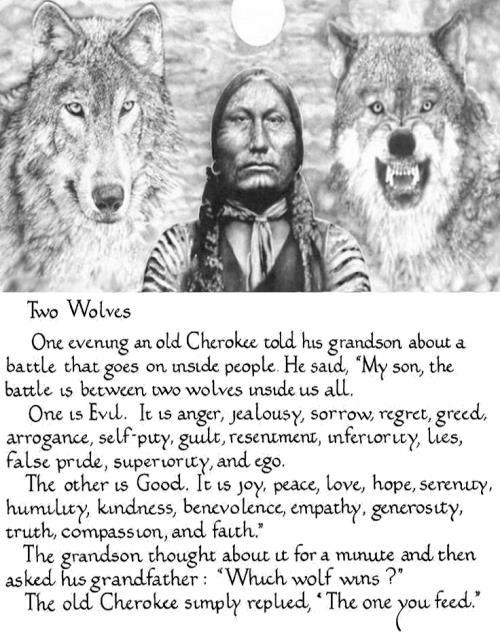via Keep Evil at Bay
Let me begin by saying, we do keep evil at bay by not acknowledging it and turning away if we do. Hannah Arendt referred to this as the “banality of evil” in her book Eichmann in Jerseleum. Now, I have not read anywhere where Arendt deals with her relationship with Martin Heidegger, an anti-semite and member of the National Socialist Party during World War II.
As well, when we use the word mindfulness do we mean just being aware or do we bring with it the ethical water to purify our world, words, and acts. This is enriching in this wonderful post by Michele. She provides quotes to point us towards the ethics of a mindful life and and thoughts about how to keep evil at bay.
Ultimately, how do I choose to live and who I am? Is this the person I want to be? It does not mean perfection; far from it. It means I take time to ask who I am becoming and who I want to become.
As I read Michele’s post, it reminded me of the Cherokee story about two wolves that live in each of us and which one we choose to feed:

I tell students we mistake values for beliefs. Values are what strengthen us. They emerge from each of our hearts and offer courage to do what is proper, not right as a binary choice. On the other hand, beliefs force me to create a world to fit those beliefs and defend it.
If I feed myself with Good, with qualities of joy, peace, love, hope, serenity, truth, compassion, and faith, I have strength and courage to stand up for what might make the world a better place in an indefinable way and, at the same time, not become attached to that thought so I cannot let go.





Well said, Ivon. I appreciate this post very much. Asking those all important questions is essential, and not just asking once. It’s an ongoing self inquiry. This is what evolution is…especially in the face of the potential for devolution. Thank you for the inspiration this day.
You are welcome Carrie and thank you. Michele gave me a great place to begin.
It is about examining one’s life to make it worth living on an ongoing basis and to live in community in caring and ethical ways.
Thanks for reminding us that each culture has a “wolf story” as part of the the Perineal Philosophy
That is so true Roy. I am reading Joseph Campbell, The Power of Myth, and he says there are universal themes we find in various myths. They emerge at similar times to guide people and need to be revisited as we move forward.
The Cherokee story is so fitting right now. Let’s hope more people will feed the Good Wolf inside of them. I have been seeing much kindness shown in the last few days.
There is definitely an uptick. Maybe challenging times bring out the good wolf in each of us.
“ethical water to purify our world, words, and acts”
You certainly know how to express yourself well. I’m SO glad that you have such good things to say to help us feed our “good wolf.” Keep the “food” coming. LL
Thank you Laura-Lee. I will try my best.
So beautifully said once again ❤ ❤
Thank you Patrice
Thank you Ivon for mentioning my post. I really appreciate it. I have always loved the Cherokee story of “Two Wolves.” This is a story all of us should always remember.
You are welcome. It seemd to strike a chord with others and me. It is a beautiful story we should each keep close to our heart.
Great story which explained a lot! Thank you for sharing.
Thank you Alexander and you are welcome. Take care, be well, and share your wonderful pictures.
Thank you, I will.
Reblogged this on By the Mighty Mumford.
Thank you Jonathan.